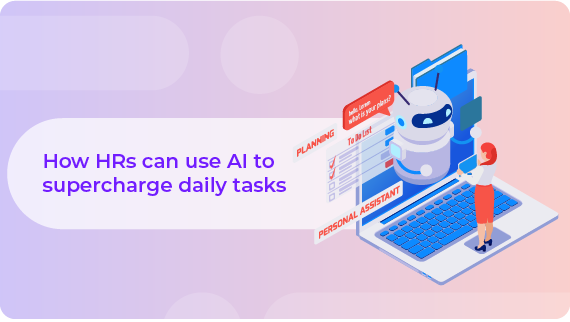2025 is here and the landscape of Human Resources is evolving like no other. The pandemic is already news from 5 years ago, and the world has undergone a significant transformation since. The new year is an opportunity for both, challenges as well as opportunities for HR leaders.
As we navigate the complexities of this rapidly changing world, all professionals must stay ahead of the curve and adapt to emerging HR trends, whether it’s integrating new technologies like AI, or adapting to the changing expectations of a younger, more diverse and a more vocal workforce. To navigate these shifts, HR professionals need to be even more flexible, innovative, and equipped with the right tools to foster a thriving workplace that benefits both employees and the company.
The Rise of Remote Work in the UAE
The UAE has been at the forefront of embracing remote work, particularly post-pandemic. This HR trend is set to continue in 2025, with more organizations adopting flexible work arrangements.
Key Implications for HR:
- Talent Acquisition: Expanding the talent pool beyond geographical boundaries.
- Employee Experience: Creating engaging remote work cultures and providing necessary tools and support.
- Payroll and Compliance: Ensuring timely and accurate payroll processing for remote employees, adhering to the local labour laws and regulations.
- Performance Management: Developing effective remote performance management strategies.
As more organizations embrace hybrid and remote work models, the need to foster a positive employee experience will only intensify. It’s crucial for HR teams to find innovative ways to ensure that even their remote employees always feel connected, supported, and a part of the company’s broader culture. This may involve leveraging new technology, redefining workplace norms, and offering employees more opportunities to shape their own work environments.
The Impact of AI and Automation on HR
Artificial Intelligence (AI) and automation are revolutionizing HR processes. From recruitment to payroll, AI-powered tools are streamlining operations and improving efficiency across minor as well as major tasks. The potential of AI to streamline recruitment, improve employee training, and enhance decision-making is undeniable, however, AI adoption for enhancing employee experiences cannot be a one-size-fits-all solution.
Key Implications for HR:
- Recruitment: Leveraging AI-powered tools for candidate screening and skills matching.
- Onboarding: Automating onboarding processes to improve the new hire experience.
- Payroll: AI-driven payroll solutions to ensure accurate and timely payments that are also compliant with the local regulations.
- Employee Engagement: AI-powered analytics to measure employee sentiment and identify areas for improvement.
Employee experience goes beyond perks and benefits; it’s about creating an environment where employees feel truly supported at every stage of their journey within the company. HR leaders will need to invest in tools that help track not only job satisfaction but also the emotional and professional well-being of their workforce.
Pay your employees on time: always trending! 💙
Timely payroll processing is a fundamental HR responsibility. In the UAE, where a significant portion of the workforce comprises expatriates, accurate and timely salaries are crucial beyond measure
Key Considerations for HR:
- Robust Payroll Systems: Implementing reliable payroll software to automate calculations and deductions.
- Compliance with Labour Laws: Staying updated on the UAE labour laws and ensuring adherence to WPS regulations.
- Employee Satisfaction: Timely payment contributes to employee satisfaction and morale.
- Financial Health: Timely payroll ensures the organization’s financial health and avoids penalties.
Other popular HR trends that people are talking about, and that are likely to shape the industry in 2025:
1) Increased Focus on Employee Well-being
- Mental Health: Employers will prioritize mental health initiatives, offering resources like counselling, meditation apps, and flexible work arrangements.
- Work-Life Balance: Continuing to promote work-life balance through flexible work hours, remote work options, and generous leave policies.
- Physical Health: Encouraging physical activity through wellness programs, gym memberships, and healthy eating initiatives.
2) Diversity, Equity, and Inclusion (DE&I)
- Diverse Hiring Practices: Implementing strategies to attract and retain diverse talent.
- Inclusive Workplace Culture: Fostering a culture of inclusivity and belonging.
- DE&I Training: Providing regular training to employees to promote awareness and understanding.
3) Green HR
- Sustainable HR Practices: Adopting eco-friendly HR practices, such as reducing paper usage, promoting remote work, and implementing recycling programs.
- Social Responsibility: Engaging in corporate social responsibility initiatives that align with sustainability goals.
4) Gig Economy and Freelancing
- Flexible Workforces: Leveraging gig workers and freelancers to meet specific project needs.
- Managing Contingent Workers: Developing effective strategies for managing and engaging contingent workers.
5) Fostering Workplace Civility in a Polarized World
Workplace civility is more important than ever. In a world filled with political and social tension, HR leaders must create a respectful and civil work environment. This involves:
- Promoting Respectful Communication: Encouraging respectful dialogue and discouraging incivility, such as microaggressions or outright rudeness.
- Implementing Effective Complaint Mechanisms: Establishing clear processes for reporting and resolving workplace issues.
- Leading by Example: Senior leaders should model respectful behavior and hold employees accountable for unprofessional conduct.
6) HR’s Role in Managing Public Relations and Reputation
- Internal and External Perception: HR will need to manage both internal and external perceptions of the company, especially regarding workplace practices, diversity, pay equity, and benefits.
- Proactive Communication: Proactive communication strategies will be crucial to maintain both internal morale and external reputation.
- Alignment with Company Values: HR decisions must align with the company’s values to avoid negative public backlash.
- Crisis Management: HR leaders must be prepared to handle PR crises related to HR decisions.
- Transparency: Transparency in communication is key to building trust with employees and the public.
➡️ The Future of HR: A Blend of Technology and Human Touch
While technology is reshaping the HR landscape, the human element remains indispensable. HR professionals will need to balance the use of AI and automation with a strong focus on employee well-being, engagement, and development.
Key Strategies for HR:
- Upskilling and Reskilling: Investing in training and development to equip HR professionals with the necessary skills to navigate the digital age.
- Data-Driven Decision Making: Leveraging data analytics to make informed decisions.
- Ethical AI: Ensuring that AI is used ethically and responsibly.
- Employee Experience: Prioritizing employee well-being and fostering a positive work culture.
To conclude, 2025 will be a pivotal year for HR. As organizations navigate change, diversity, and technology, HR will lead the way. By prioritizing employee experience, flexibility, and ethical leadership, HR leaders will create resilient, future-ready workplaces. To succeed, HR professionals must embrace these HR trends and prepare for the challenges ahead, fostering innovative, inclusive, and successful work environments.





